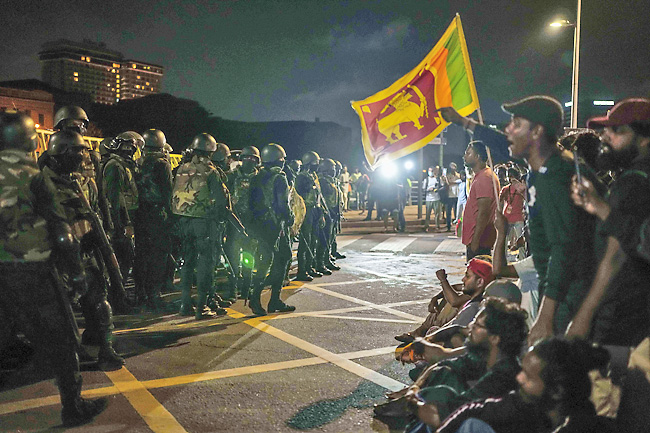COLOMBO, SRI LANKA (AP) – Sri Lankan forces violently cleared the main protest camp of demonstrators outraged by the country’s economic meltdown as the newly elected and deeply unpopular president put army troops in the streets of the capital yesterdayto maintain order.
Security forces were seen beating at least two journalists during the overnight raid, and the bar association said two lawyers were also assaulted – heavy-handed tactics denounced by the opposition, the United Nations, and the United States. The troops moved in even though protesters had announced they would vacate the site yesterdayvoluntarily.
Unbowed, the protesters vowed to continue their efforts to change their leadership. A crowd rallied for a few hours outside the main rail station, while some people also gathered as close as they could to the former demonstration site outside the presidential office.
Adding to signs that President Ranil Wickremesinghe would not address the concerns of protesters, he chose a Prime Minister yesterday with close ties to the political establishment that the demonstrators blame for the country’s collapse.
Sri Lankans have taken to the streets for months demanding their leaders resign over an economic crisis that has left the island nation’s 22 million people short of essentials like medicine, food and fuel.

After they stormed the presidential palace and other government buildings earlier this month, then-President Gotabaya Rajapaksa, whose family has ruled Sri Lanka for most of the last two decades, fled and resigned.
Wickremesinghe, who had been Prime Minister, was elevated to President by lawmakers this week – apparently seen as a safe pair of hands to lead Sri Lanka out of the crisis, even though he, too, was a target of the demonstrations.
Yesterday, he appointed as prime minister a Rajapaksa ally, Dinesh Gunawardena, who is 73 and from a prominent political family.
After his election, Wickremesinghe told lawmakers that the people “are not expecting the old politics from us.” But his recent moves signaled an inclination to maintain the status quo.


